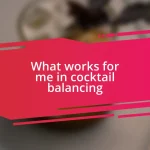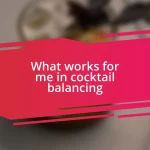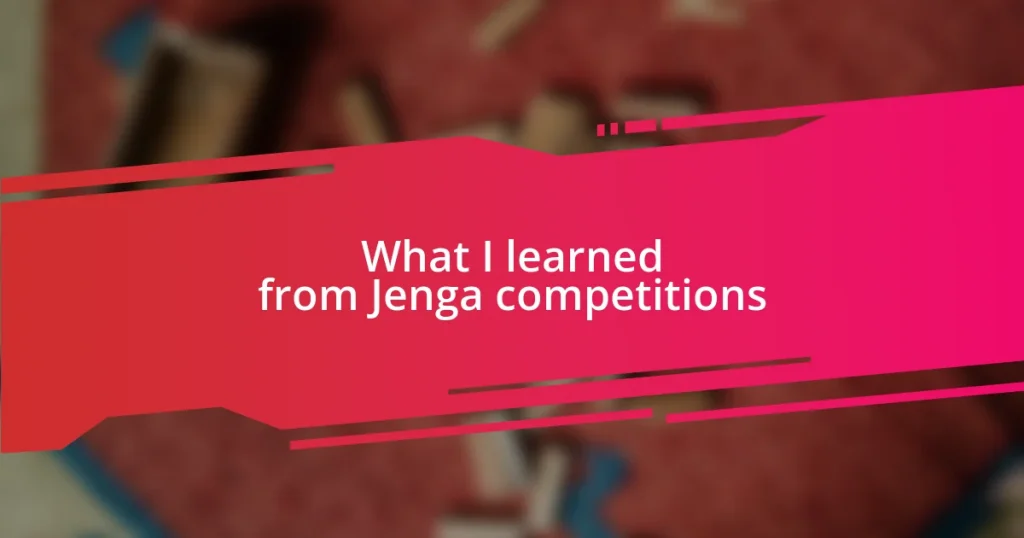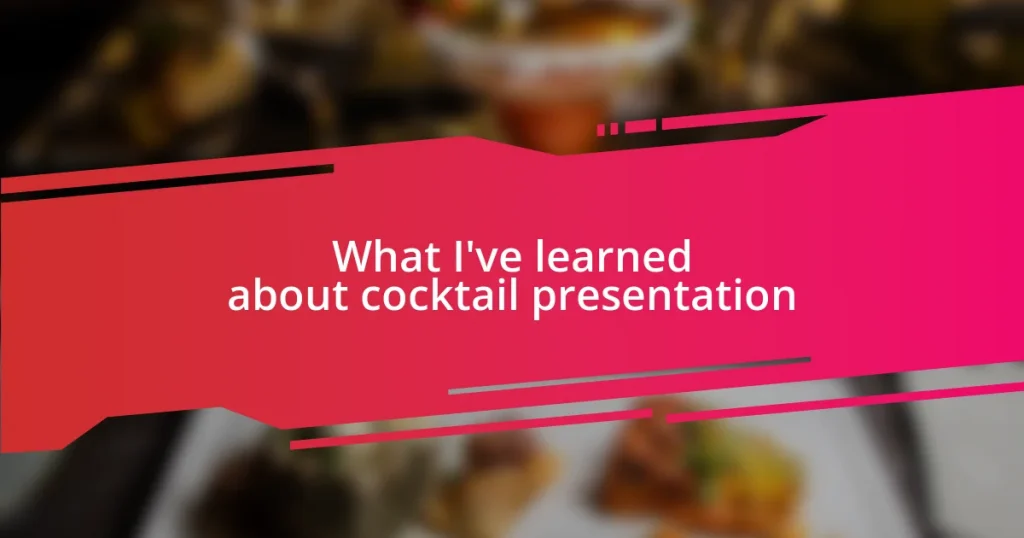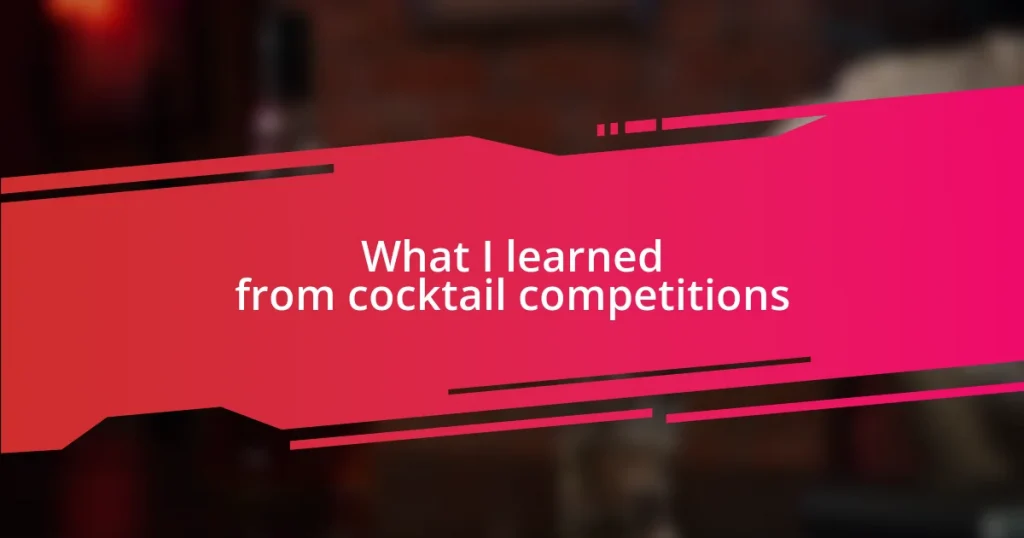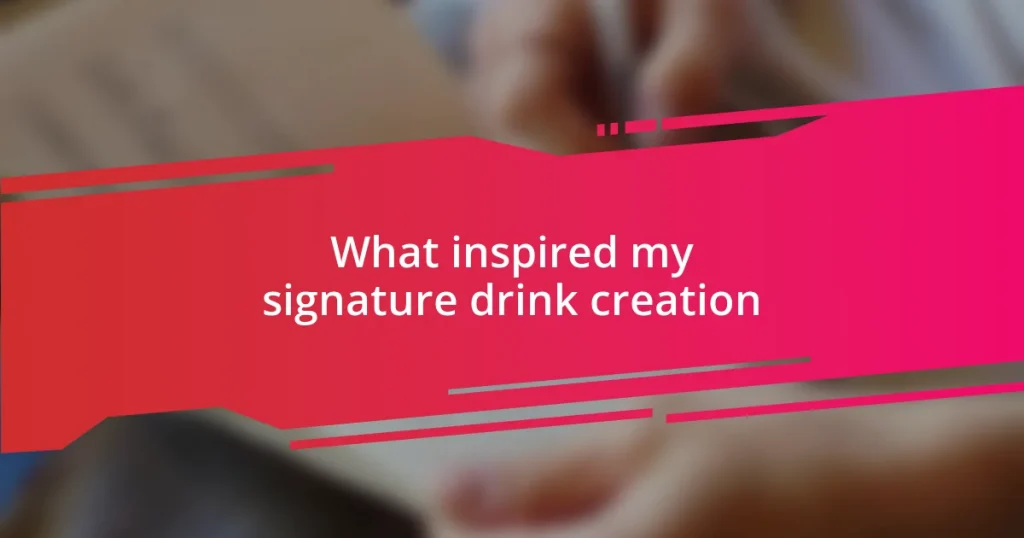Key takeaways:
- Jenga enhances mental skills such as focus, strategic planning, and patience, making it a valuable cognitive exercise.
- Successful gameplay relies on strategies like patience, gently assessing block stability, and prioritizing middle blocks for better tower stability.
- Team dynamics in competitions highlight the importance of communication, adaptability, and shared roles, turning individual challenges into collaborative efforts.
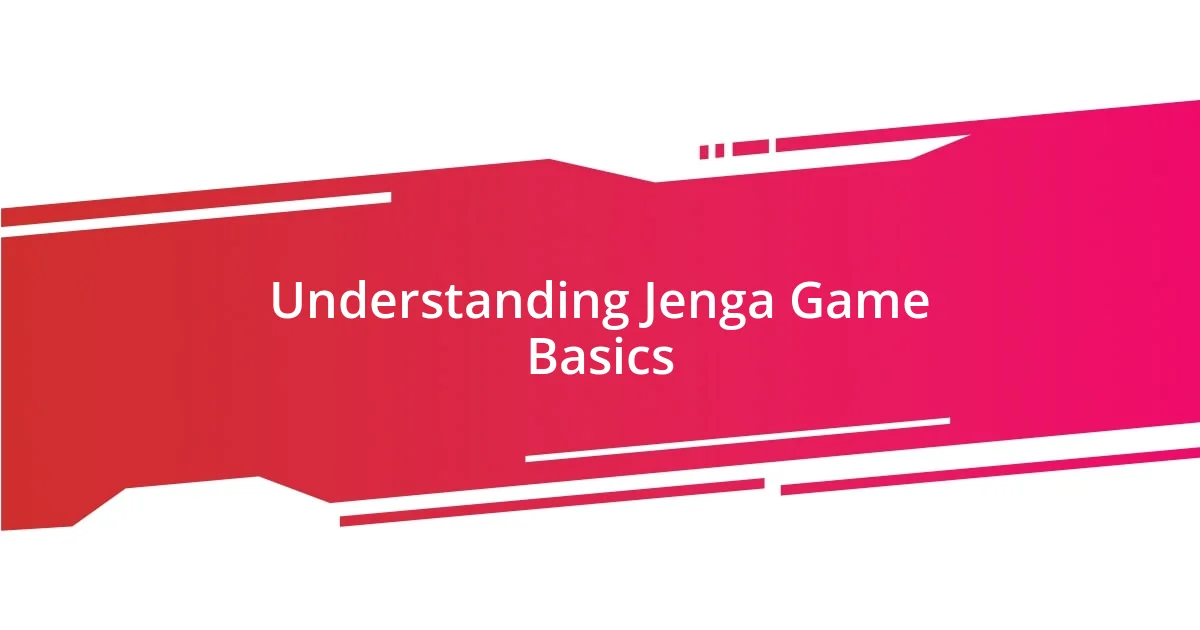
Understanding Jenga Game Basics
Jenga is a game that mixes strategy and balance in a captivating way. Each player takes turns removing one block from the tower and placing it on the top, testing their skills and nerve. I remember my first time playing—my heart raced with each move, a mix of excitement and fear that I might be the one to topple the tower.
The game starts with a sturdy stack of 54 wooden blocks, positioned in layers of three, stacked perpendicular to the ones below. It’s intriguing how such a simple concept can create such tension. As I watched my friends strategize, I realized that assessing each block not only involves physical skill but also an understanding of the game’s dynamics—how shifts in weight could lead to a shaky foundation.
Have you ever wondered why Jenga can feel so intense? It’s that blend of anticipation and camaraderie. I often find myself laughing and groaning with friends, sharing those fleeting moments before a block is pulled, which makes the game not just about winning, but also about connecting with others through shared experience.
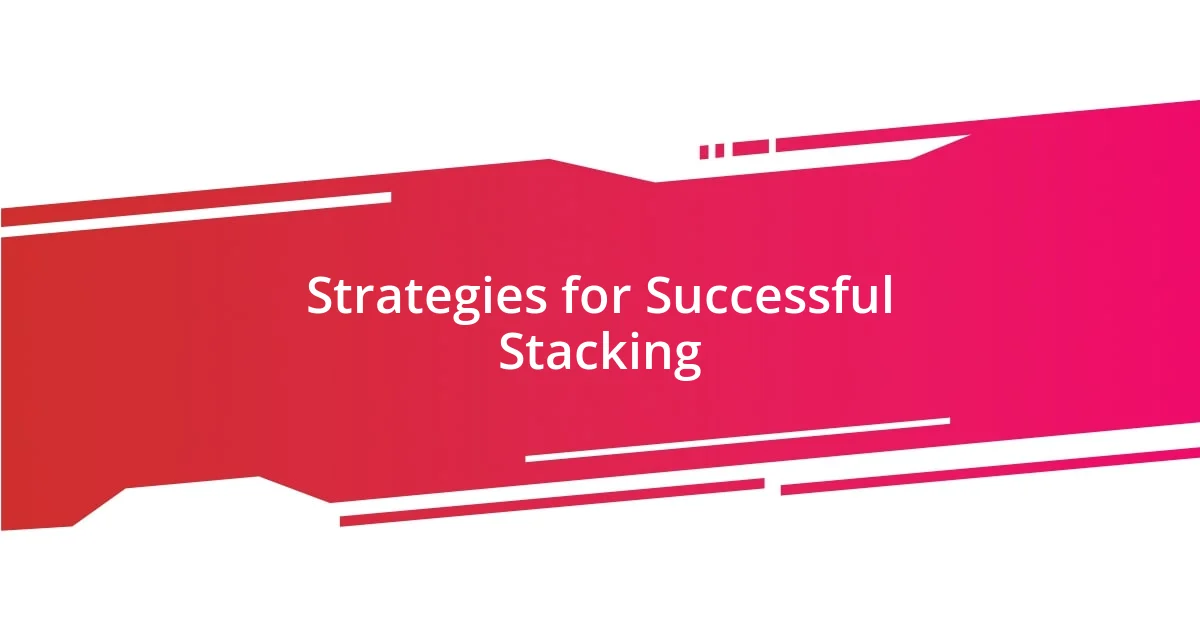
Strategies for Successful Stacking
When it comes to successful stacking in Jenga, I’ve learned that patience is a virtue. Rushing through your turn often leads to catastrophic results, as I vividly remember the time I hastily tugged on a block, only to send the entire tower crashing down. Taking the time to analyze not just the block you want to remove but also the overall structure can provide invaluable insights, leading to a more stable tower.
One key strategy is to assess the tower’s balance carefully. I’ve developed a habit of gently nudging blocks before deciding which to pull. This slight movement informs me whether a block is loose enough to remove without disturbing the tower’s integrity. It’s fascinating how a soft touch can be the difference between triumph and disaster in this game—how does your approach change when you learn to listen to the tower?
Another strategy I found effective is focusing on the middle blocks rather than the edge ones. I recall a particularly thrilling match where I shifted my focus to the center, allowing me to maintain a stronger foundation. This adjustment not only prolonged the game but also heightened my enjoyment as I watched my friends squirm under the pressure of their own choices. Ultimately, it’s about balancing risk and creativity in stacking, isn’t it?
| Strategy | Description |
|---|---|
| Patience | Take time to analyze your options to avoid premature moves. |
| Gentle Nudge | Assess blocks by gently nudging them to gauge stability before removal. |
| Central Focus | Prioritize middle blocks for a stronger foundation and better tower stability. |
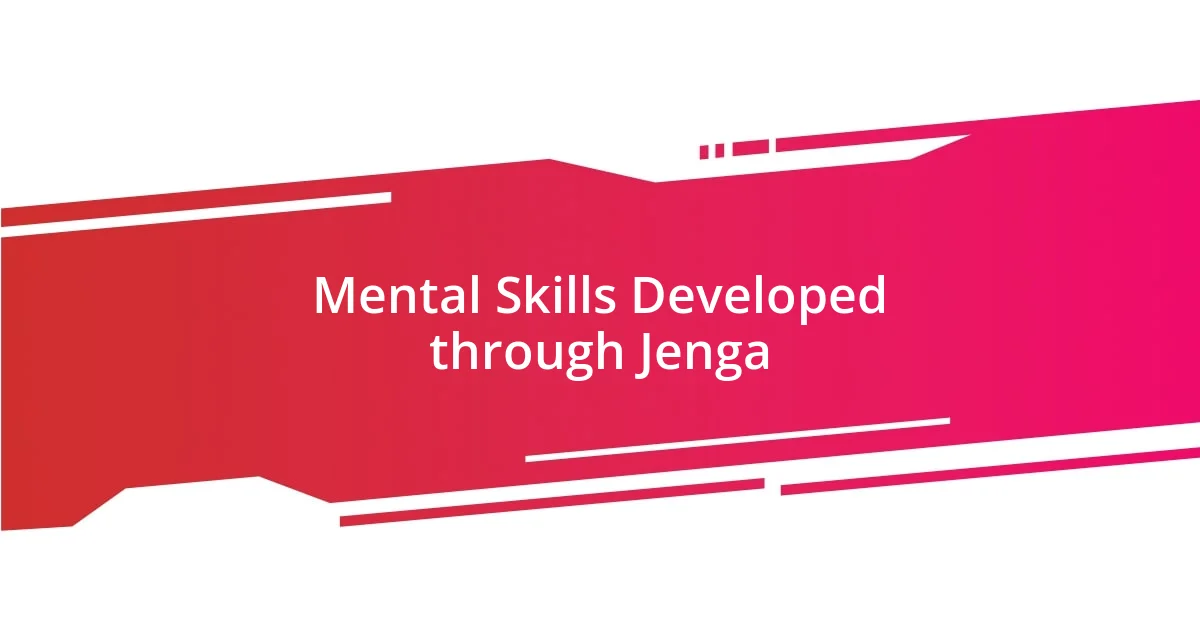
Mental Skills Developed through Jenga
When I think about Jenga, I realize it’s much more than just a game; it’s a mental workout. Engaging in Jenga competitions has honed my focus, enhancing my ability to concentrate on the task at hand. I often catch myself zoning everything else out when it’s my turn, fully immersed in the structure before me. This level of concentration trains my mind to block out distractions, a skill that I’ve found useful in many aspects of my life, whether I’m studying for an exam or completing a work project.
Another mental skill that I’ve developed is strategic planning. Each move in Jenga requires foresight—considering not only the immediate consequences but also the potential impacts down the line. I vividly remember a match where I had to weigh multiple choices, each with varying levels of risk. Choosing the wrong block could send ripples through the entire tower. Here’s what I’ve learned during those tense moments:
- Focus: Sharpening my concentration helps me assess the tower with clear eyes.
- Planning: Anticipating the effects of each move fosters critical thinking and decision-making skills.
- Patience: Waiting for the right moment allows for more calculated and less rushed decisions.
These moments of intense reflection have made Jenga a mental exercise that surpasses mere entertainment, transforming it into a valuable tool for developing important cognitive skills.
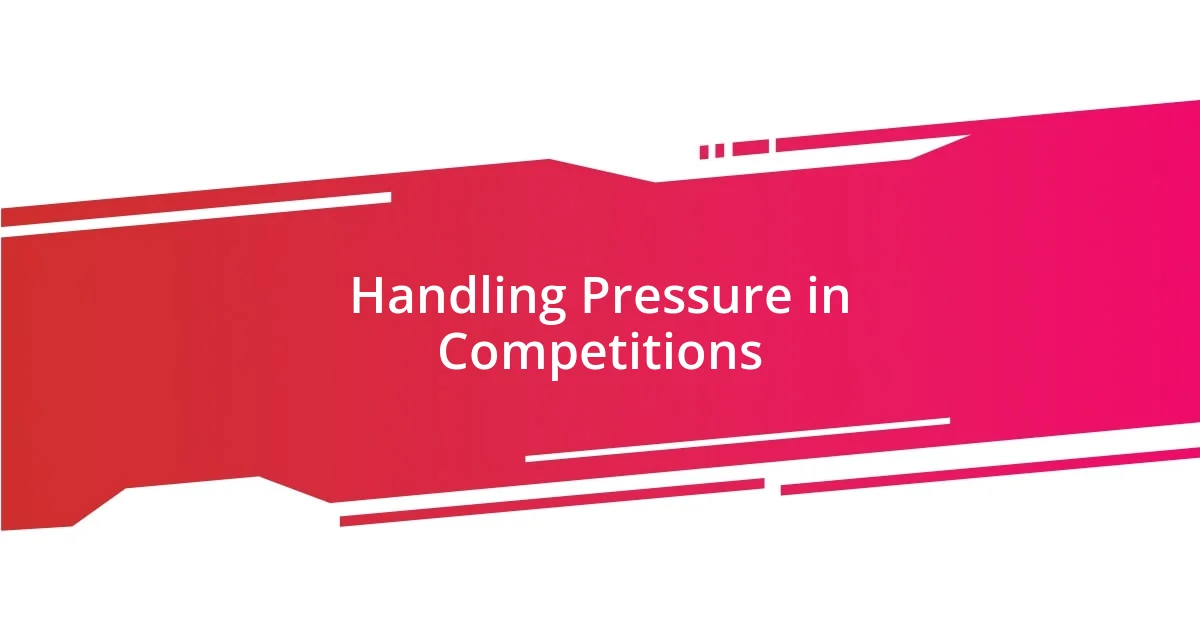
Handling Pressure in Competitions
An unforgettable moment in a Jenga competition taught me a pivotal lesson about handling pressure. I remember a match where the stakes were high, and everyone was watching. With my heart racing and palms sweaty, I had to remind myself that I wasn’t just playing a game; I was also building my resilience. This experience made me realize how important it is to stay calm, breathe deeply, and maintain focus—even when the pressure is on. Have you ever felt your heartbeat accelerate in a similar high-stakes situation?
Handling pressure isn’t just about stiffening up; it’s about embracing the adrenaline rush. There was a time when I completed a series of moves flawlessly, but then the inevitable happened: my hand trembled as I reached for a particularly precarious block. Instead of letting the nerves get the better of me, I took a moment to re-center my thoughts. Surprisingly, that pause allowed me to visualize the outcome and make a more calculated move. Isn’t it interesting how a brief moment of stillness can lead to clarity in chaos?
Ultimately, the key to thriving under competition pressure is practice and positive visualization. Every time I step up to that tower, I remind myself of my previous victories and setbacks. In each competition, I find myself learning more about my ability to adapt and how to remain true to my strategy, no matter the external pressure. It’s a continuous journey, but I’ve found that the more I confront that pressure, the more equipped I am to handle whatever comes next. What strategies do you use to manage pressure in competitions?
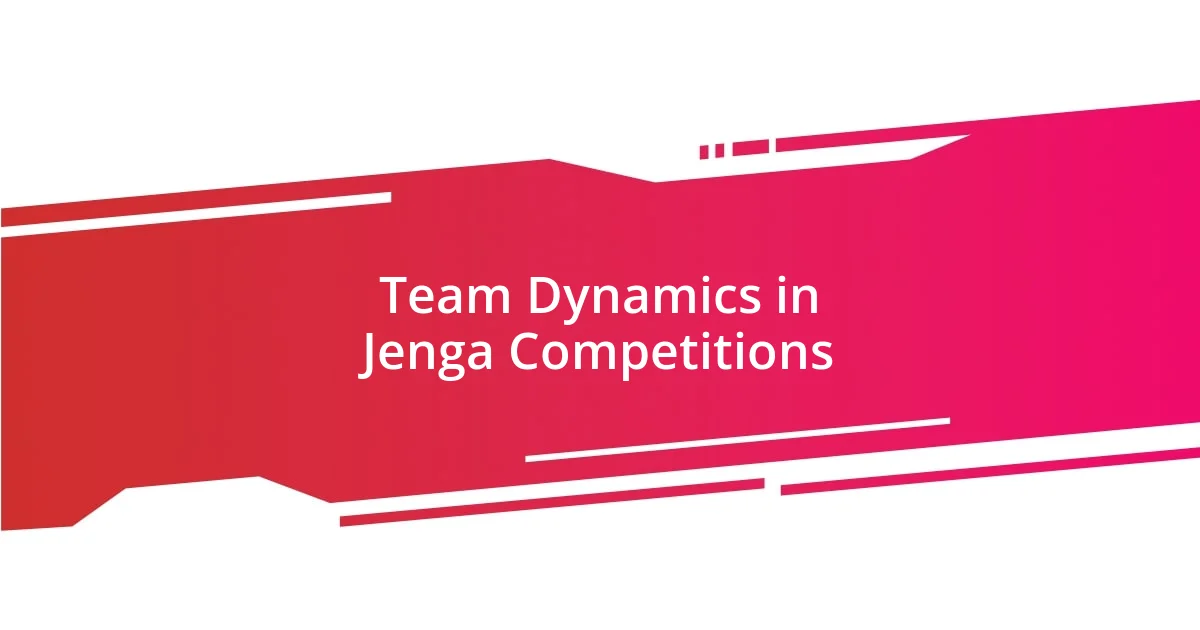
Team Dynamics in Jenga Competitions
Navigating the team dynamics in Jenga competitions can be quite fascinating. I remember one particular competition where my teammates and I developed an intuitive rhythm. Each of us had specific roles—one focused on assessing the tower, while another decided on block selection. This collaboration created a sense of synergy, showcasing how teamwork can turn the game from a solitary challenge into a unified effort. Have you ever felt that kind of unspoken connection with teammates?
Communication plays a crucial role in these high-stakes environments. During one match, I noticed that as I relayed my thoughts about potential moves, my teammates responded with nods or suggestions. This back-and-forth not only reinforced our strategy but also kept our spirits high. The laughter and advice exchanged helped diffuse tension, reminding me that while winning is great, having fun as a team is essential to the experience. Has a light-hearted moment ever changed the atmosphere for you during a competitive event?
Ultimately, adaptability stands out in team dynamics. There was a moment in a tense competition when I miscalculated a block, leading to an unexpected collapse. Instead of dwelling on the mistake, my team quickly regrouped and adjusted our approach. This taught me that flexibility is key—not just in the game, but in how we interact with our teammates. How well do you think you can pivot in the face of setbacks during group activities? The ability to adapt together can transform challenges into opportunities for growth.
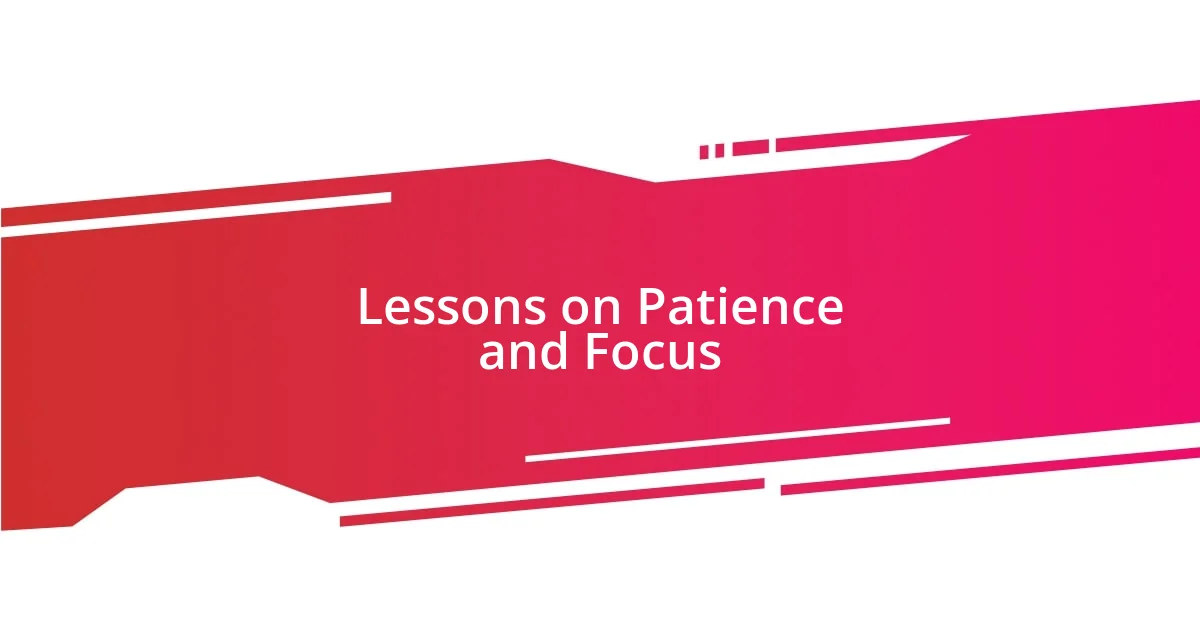
Lessons on Patience and Focus
Embracing patience during Jenga competitions has been a game-changer for me. I recall a gripping moment when I was about to topple the tower. My instincts screamed to act quickly, but instead, I took a deep breath and let the tension dissolve. It was fascinating to see how that moment of stillness not only calmed me but also helped me make a more calculated decision about the next block. Have you ever noticed how slowing down can actually speed up your thinking?
Focus, I’ve learned, is about filtering out distractions. In one intense match, the noise from the crowd seemed to swell, pulling my attention in every direction. Yet, I discovered that by zeroing in on the task at hand—the tactile feel of the blocks and the configuration of the tower—I could drown out the chaos around me. This experience really highlighted the importance of mental clarity and focus, don’t you agree? It’s almost magical how narrowing your perspective can sharpen your skills in such a demanding environment.
Ultimately, the combination of patience and focus has been crucial in my Jenga journey. I can’t help but recall a particular game where I chose to wait for the perfect moment to pull a block. Such an approach paid off, allowing me to seize the advantage and set up for the win. This taught me that in life, as in Jenga, sometimes the best move is to simply take a moment and reassess. Have these lessons on patience and focus resonated with your own experiences in tense situations?



